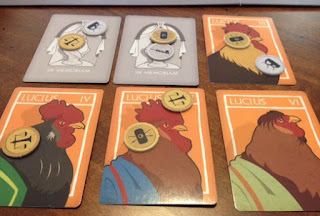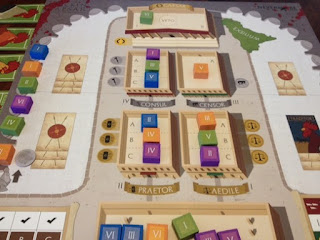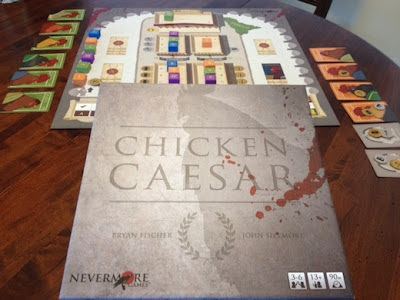Now is the time to rise up and crush our opponents! And feed them to the people, fried! Because that's (apparently my made up way of) how you do things in Chicken Caesar.
More correctly, in Chicken Caesar, your rooster family will battle it out with all of your rivals in an effort to be the most honored chickens in the coop. (Though, lots of your roosters will be dead, and thus won't actually be in the coop.) Each turn consists of filling up offices (by votes and bribery), performing the roles of those offices (like charging taxes, and then getting killed for it), collecting medals for your offices, killing off chickens (roosters), and then attempting to honor your dead chickens (again, roosters - though the game is named after chickens). Ultimately, the goal of each of these actions is to get more medals (each office gives you a specific medal), because they are worth victory points. But, moreover, you want to get a lot of the same medals. Here's the catch - each rooster can only have one copy of each medal. So, it is important to get as many of your roosters in the chosen office as possible. And, when not possible, you will attempt to place excess medals on your dead roosters. At the end of the game (when one player is out of roosters, or when there aren't enough roosters to fill all of the offices), whoever has the most money (including money earned based on the number of medals on your roosters) is the winner!
Overall, the biggest pro for Chicken Caesar is that it is a very enjoyable political game that plays in a relatively short period of time. (Should I go on, or was that enough of a "review"? No? You want more? Fine...) Now, when I say "short," keep in mind that the length of the game is entirely up to your play group. Since it is all about negotiations, if you let the bantering drag on forever, then the game will most definitely not be short. Additionally, the speed of the game (how quickly chickens die, thus leading you to the game end condition) is also based on the tax rates that are set throughout the game. However, the players setting the taxes have a large incentive to set the taxes high (they collect money based on the tax rate), and so normally games will have high tax rates and therefore high death tolls. In most of the games I've played (including learning games), the game only takes 90 minutes or less. But, with all of that, I have always felt satisfied at the amount of negotiation, bribery, and all around politicking that went on in our games.
 |
| Collect lots of medals on different roosters |
The last pro that I will mention is the posthumous award of medals. Though this element of the game hasn't played a big role in the games that I have played (because we killed so many roosters that the game ends about the same time that we have extra medals to award), this aspect of the game still adds a nice twist. For example, if you don't have any dead roosters, then guess what - you can't award them with anything posthumously! So, though it is good to keep your roosters alive so that they can hold a lot of offices (and perform the corresponding actions), it is also sometimes good to kill off one or two of your roosters so that you can give them extra medals. Plus, the awarding of these extra medals to dead roosters makes the Consul role very powerful - but only during certain times during the game. So, it is important to strategically choose when to promote your roosters into this role to get the most out of your opportunities.
 |
| Does this remind anyone else of a squirrel with a nut? |
Second, since this is a negotiation game, be aware that perception is much more important than reality. So, if someone looks like the weakest player, they will often be able to get favors from other players that are looking to avoid helping one of the "strong" players. This is simply the nature of political games - but I know that this is something that might bother certain people, so I wanted them to be aware of it.
So, with all of that said, what did I find in Chicken Caesar that I consider a con? Well, first and foremost, there is a lot more "king making" than I would like. (If you're not familiar with the term king making, it is a term for one player deciding who wins the game, or gets a very favorable position, without actually helping themselves in the process.) I think that one reason for this is how points stack up towards the end of the game. So, getting a fifth consul medal is worth 10 points? Then there is a good chance that the censor will exile the rooster that is about to get his fifth medal, thereby costing him ten points. In a game where scores are often in the 30-40 range, 10 points can be the difference between winning the game and coming in last. As another example, if you are a Consul, then you get to choose whether a posthumous medal is awarded successfully. Now, obviously, the goal is to get your own rooster in position to be able to approve your posthumous offer. But, if you can't do so, and you attempt to nominate one of your deceased birds, then chances are that a different player will be making a decision that will drastically affect your final score. Some elements of king making I think come with the territory when you make a game all about negotiation between players, but I feel like it is a bit more noticeable in Chicken Caesar.
 |
| Fighting for positions |
The last con that I will list is that the Consul role is neglected more than I would like. Now, let me caveat this con - this was in the games that I played. In the games that I played, we constantly had high tax rates, because the people setting taxes liked having hoards of money (after all, money means victory). But, because of the high taxes, we were having several roosters die each round which causes the game to only lasts a few rounds. The Consul role literally does nothing the first two rounds. (The first round you have nobody that is dead, and you cannot collect a second medal with the same rooster until the "Award" part of the second round.) So, at the earliest, the Consul role will actually make decisions in the third round. Practically speaking, it will probably not do anything until the fourth or fifth round in most games. And, when the game only lasts about five or six rounds (this part I'm guessing at, because I didn't keep count), then the Consul role will not do much for most of the game. Now, when the Consuls do make decisions, they are super, crazy important and worth tons of points. But, for most of the game you ignore them. (Unless you play with low taxes, in which case they can become much more important.)
Overall, I give Chicken Caesar an 8.0/10. I had heard mixed opinions about the game before getting to try it for myself, but ultimately, I have truly enjoyed my plays of the game. The king making element leaves me a touch disappointed, but I would be happy to continue playing it more if my game group suggests it.
If you're interested in Chicken Caesar, you might also check out Quo Vadis, Zombie In My Pocket, and Family Business.
I would like to thank Nevermore Games for providing me with a review copy of Chicken Caesar.



0 komentar:
Posting Komentar